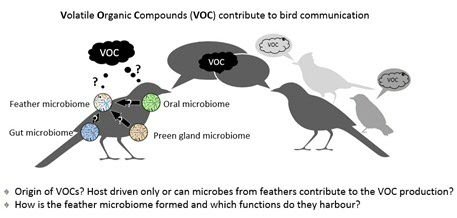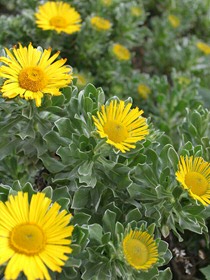Two ENW-KLEIN grants at GELIFES
Prof. Irene Tieleman and Prof. Joana Falcão Salles, both GELIFES, have received an ENW-KLEIN grant from the Netherlands Organization for Scientific Research (NWO) worth EUR 710,000. The grant is for their project ‘Microbiome-mediated functions of avian preen glands: understanding the chemosignalling and antimicrobial potentials’. In addition, Prof. Rampal Etienne (GELIFES) has received an ENW-KLEIN grant as a co-applicant. Together with Dr. Frederic Lens from Naturalis, he receives EUR 708,000 for the project ‘Untangling species diversification on islands: the role of traits’.
Prof. Tieleman and Prof. Falcão Salles | ‘Microbiome-mediated functions of avian preen glands: understanding the chemosignalling and antimicrobial potentials’:
Birds are inhabited by communities of microorganisms, that fulfil beneficial functions for their hosts. Some scientists therefore propose that animals should not be considered as animals, but as meta-organisms – obligate symbiotic life forms of animals with their microorganisms. Until recently, most attention has focused on gut microbes. This project will investigate which microorganisms live in preen glands of birds, and what – through preening of feathers – the contributions are of these microorganisms to the communication between birds and to the antimicrobial protection of their plumage. The investigators expect to find associations between microbial functions and life history strategies of birds.


Dr. Frederic Lens (Naturalis) and Prof. Rampal Etienne | ‘Untangling species diversification on islands: the role of traits’:
Due their isolation and well-defined boundaries, islands have been considered excellent case studies to unravel evolutionary process that have shaped present’s day biodiversity. However, one of the unresolved key questions in biodiversity research is why some animal and plant lineages have radiated spectacularly, while others remained species-poor or did not radiate at all. To solve this long-standing problem, Lens and Etienne want to develop a new theoretical island model that investigates the impact of potential key traits on speciation and extinction of species, using the most abundant plant family on islands (sunflower family) and the best studied archipelago (Canary Islands).
ENW-KLEIN
The ENW-KLEIN grant offers researchers the opportunity to establish scientific innovations that can form the basis for research themes of the future.
| Last modified: | 12 April 2021 09.19 a.m. |
More news
-
03 April 2025
IMChip and MimeCure in top 10 of the national Academic Startup Competition
Prof. Tamalika Banerjee’s startup IMChip and Prof. Erik Frijlink and Dr. Luke van der Koog’s startup MimeCure have made it into the top 10 of the national Academic Startup Competition.
-
01 April 2025
NSC’s electoral reform plan may have unwanted consequences
The new voting system, proposed by minister Uitermark, could jeopardize the fundamental principle of proportional representation, says Davide Grossi, Professor of Collective Decision Making and Computation at the University of Groningen
-
01 April 2025
'Diversity leads to better science'
In addition to her biological research on ageing, Hannah Dugdale also studies disparities relating to diversity in science. Thanks to the latter, she is one of the two 2024 laureates of the Athena Award, an NWO prize for successful and inspiring...
